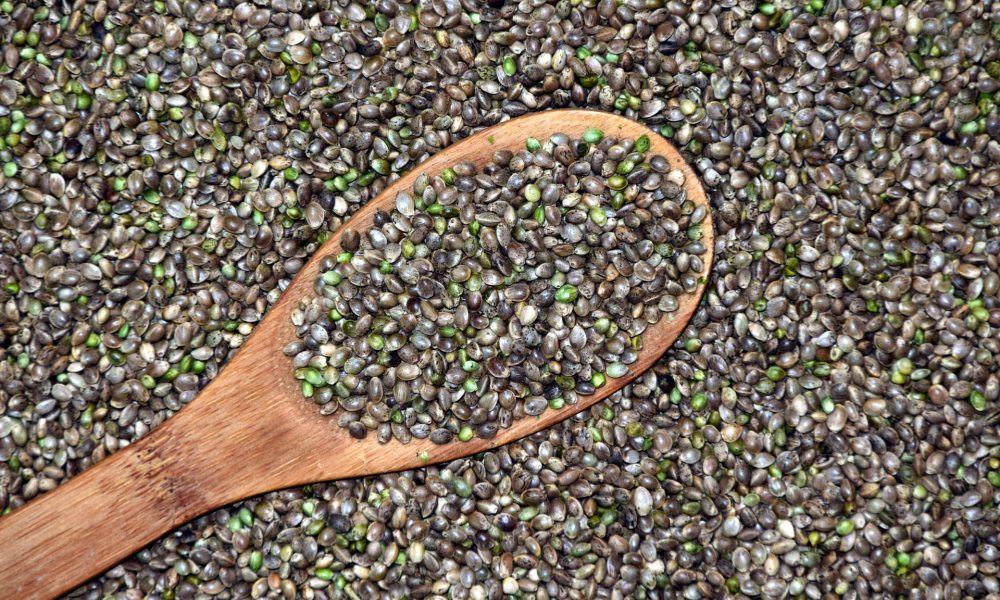The New York legislature has sent a pair of bills to the governor that would allow hemp seeds to be included in animal feed for pets, horses and camelids such as llamas and alpacas.
About five months after the Assembly and Senate passed the legislation from Assemblymember Donna Lupardo (D) and Sen. Michelle Hinchey (D), the identical versions from each chamber were transmitted to Gov. Kathy Hochul (D) on Wednesday.
The measures specify that industrial hemp seed that could be added to certain animal feed includes seed hulls and seed meal. Supporters say that the cannabis products could be a nutritious additive that’s high in protein and fiber.
“Industrial hemp produces a wide range of useful materials, including building materials, fibers that can be woven into clothing, chaff for animal bedding, and seeds that are available on grocery store shelves in items [like] granola, snack bars, and cookies,” a justification memo attached to the legislation says. “Industrial hemp is federally approved for each of these uses.”
“Only the seeds of the industrial hemp plant, including shell casings and seed meal resulting from processing hemp hearts for human consumption, would be authorized for use in animal feed,” it continues. “Studies indicate that industrial hemp seed provides a high protein, high fiber ingredient for animal consumption.”
The legislation, which is similar to measures that have been enacted in Montana and Pennsylvania, is backed by the National Hemp Association.
“Protecting industrial hemp production in New York will encourage greater production and research into the myriad uses of this plant, including as a renewable building material,” the text says. “It will also open the door for small, New York-based animal food processors to establish this marketplace before hemp seeds are authorized far use in commercial feed nationally.”
A fiscal note says that the legislation could ultimately increase tax revenue for the state because of “increased sales of New York hemp seed product and commercial feed.”
The bills do not extend the hemp seed additive authorization to other commercial livestock, presumably due to regulatory complications related to adding items to feed for animals that are used for human consumption.
That said, the U.S. Department of Agriculture (USDA) recently found that cows that are fed hempseed cake retain very low concentrations of THC and CBD in their bodies, indicating that meat products from hemp-fed cattle are safe for human consumption.
Another federally funded study published last year found that feeding cows hemp reduces their stress. Researchers have also looked into how CBD affects stress and pain in horses.
The Food and Drug Administration (FDA) sent warning letters to a series of businesses marketing CBD products for animals last year, cautioning that there’s a “lack of data on what levels of potential residues are safe for a person consuming the foods that come from CBD-treated animals.”
—
Marijuana Moment is tracking more than 1,000 cannabis, psychedelics and drug policy bills in state legislatures and Congress this year. Patreon supporters pledging at least $25/month get access to our interactive maps, charts and hearing calendar so they don’t miss any developments.
Learn more about our marijuana bill tracker and become a supporter on Patreon to get access.
—
Back in New York, the governor recently signed legislation that attempts to make it slightly easier for financial institutions to work with state-licensed cannabis clients by authorizing the state’s Office of Cannabis Management (OCM) to provide them with information about marijuana business licensees or applicants.
In another attempt to ease burdens on local New York businesses, Hochul signed separate marijuana legislation to provide tax relief to New York City marijuana businesses that are currently blocked from making federal deductions under an Internal Revenue Service (IRS) code known as 280E.
While Hochul signed a separate budget bill last year that included provisions allow state-level cannabis business tax deductions—a partial remedy to the ongoing federal issue—New York City has its own tax laws that weren’t affected by that change. The new measure is meant to fill that policy gap.
Meanwhile, lawmakers in Albany have been considering potential legislative solutions to ongoing problems with the state’s implementation of cannabis legalization. At an October hearing, for example, the body discussed the state’s THC potency tax, enforcement efforts to mitigate the illicit market, licensing distribution priorities, preventing youth from accessing cannabis and laboratory testing practices, among other issues.
One of the main contentions with the state’s legalization rollout, however, has been the slow licensure of legal cannabis retailers. To that end, regulators approved settlement agreements this week that could soon allow hundreds of marijuana businesses that have been blocked from opening amid litigation to finally begin operations.
Nearly 70 Percent Of Florida Voters Support Marijuana Legalization Ballot Initiative, With Majorities Of Every Demographic In Favor
Read the full article here

